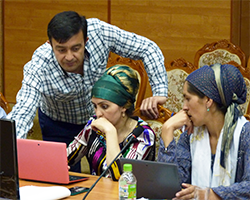Towards universal health coverage: strengthening the evidence base for policy development in Tajikistan

WHO
Recognizing that collection of accurate and up-to-date data is crucial for evidence-informed policy-making to achieve universal health coverage (UHC), WHO provided support to the Agency for Statistics under the President of the Republic of Tajikistan to gather reliable data on key areas such as health services utilization, unmet need and financial burden. The focus of the work was on updating a health module of the Household Budget Survey (HBS) and providing in-depth training for those who will be conducting the survey.
Introduction of the revised module was strengthened with the provision of training for over 100 survey interviewers from the Agency for Statistics. The training series, held on 3–26 July 2018, focused on building the capacity of interviewers, at both national and regional levels, to collect data on health services utilization and household expenditures within the scope of the routinely conducted HBS. During the training, interviewers were given guidance on processing data from the questionnaires and on fieldwork using the computer-assisted personal interviewing (CAPI) application.
The revised module questionnaire consists of six subsections, including topics such as utilization and expenditures in outpatient/emergency departments and inpatient levels, disability and social beneficiaries, and health needs. The inclusion of the revised health module questionnaire into the regular HBS makes it possible to link utilization and health expenditure data to detailed information on household consumption, including costs caused by disability.
This data will allow for a new analysis of equity and poverty dimensions, and the financial protection aspects per household, with the calculation of the burden of health-care expenditures and the estimation of the extent of catastrophic health expenditures.
“The revised health module allows us to collect data on household expenditure on health for informed policy-making and better targeting of public funds as a key strategy to mitigate the impact of out-of-pocket payments on household welfare. Also, this data will help us to monitor the implementation process of the National Development Strategy for 2016–2030 and the Mid-Term Development Strategy 2016–2020 as key tools for nationalization of the Sustainable Development Goals and the United Nations Convention on the Rights of Persons with Disabilities recently signed by our country,” said Shodmon Shokirzoda, the First Deputy Director of the Agency of Statistics, at the launch ceremony of the national level training.
The health module included disability-related questions from WHO’s Model Disability Survey (MDS). Tajikistan is the first country in the world to introduce the MDS as a part of their HBS. The main objectives of the MDS are to:
- determine the current distribution of disability in the population;
- estimate the prevalence of disability;
- identify unmet needs of people with different levels of disability;
- identify the barriers and inequalities faced by people with different levels of disability;
- provide necessary information for the development of policy priorities to improve the quality of lives of people with disabilities, in order to achieve the 2030 Agenda for Sustainable Development with no one left behind in Tajikistan.
"Health and disability questionnaires are new to us, we never collected such data. It is good that WHO organized training for us, we have learned a lot," said Zarrina Mazbutova, an interviewer from Kushonion District, Khatlon Region.
The training was offered by the WHO Country Office in Tajikistan, with the support of the EU-Luxembourg-WHO UHC Partnership and the United States Agency for International Development (USAID).



